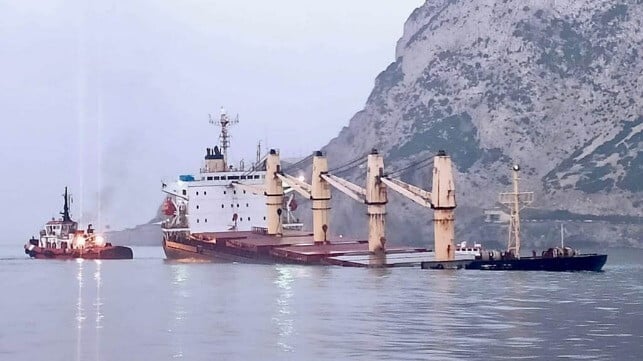Gibraltar Calls for Use of Pilots Saying OS 35 Master Misjudged Departure

Two and a half years after the accident which caused the loss of the bulker OS 35, Gibraltar’s maritime authority issued its report finding poor planning and that the captain misjudged the maneuver resulting in the casualty. The report calls for considering the compulsory use of pilots for vessels in the anchorage concluding a pilot very likely would have prevented the incident.
The bulker OS 35 was in the Western Anchorage at Gibraltar on August 29, 2022, taking on bunkers as is the common practice at the port. About two hours after the OS 35 arrived, the gas carrier Adam LNG also arrived in the Western Anchorage for a layover. She was traveling in ballast without a cargo aboard. The OS 35 completed her bunkering around 20:30 and made ready to get back underway bound for the Netherlands with a load of steel rebar.
Based on the analysis, the investigators concluded that environmental conditions were not a major factor. The OS 35 recorded the winds as light and that there was good visibility and clear skies in her log. Based on videos and other data the report concludes the current was at 0.2 knots from the west and wind speeds 12 knots from the east-north east.
Gibraltar’s regulations only require pilots for berthing and unberthing and not for departing the anchorage. The report notes incidents are rare but concludes planning for the departure was weak and not well monitored by the crew and harbor controllers. The controllers did inquire about how the OS35 planned to pass the anchored gas carrier and got a vague answer of going around. The report notes the departure was not plotted, the passage plan was not amended for the actual anchor position, and not discussed on the bridge.
After OS 35 raised her anchor, the master had ordered dead slow astern increasing the speed to 2.6 knots, but became concerned they were closing on Adam LNG due to the effects of the maneuver, tidal flow, and wind. The main engine was stopped. The master then ordered dead slow and then slow ahead and the rudder was placed hard to port. The master later telephoned the chief engineer asking for increased ahead power to maximum but the report notes it was limited by the rudder being hard over.
With OS 35 closing on Adam LNG, the speed was up to 1.3 knots when it clipped the bulbous bow of the LNG carrier holing two cargo holds. That set off the series of events with the port ordering the bulker to ground and becoming a total loss. There were additional communications problems during these subsequent maneuvers.
“The master of OS 35 made an error of judgment, which was not detected by the bridge team,” concludes the report. “Had a pilot been embarked, it is considered very likely that an alternative maneuver would have been used to depart the anchorage, which would not have included the prolonged astern maneuver. Had a pilot been aboard, it is considered very likely that the collision would have been prevented.”
Exploring the incident in further detail, the investigators also highlight that the OS 35’s procedures did not require a discussion with the bridge team, and they concluded that had the master or second officer effectively monitored the track of OS 35 they might have observed the vessel’s continued swing and taken action. The master’s revised plan for full ahead propulsion and the rudder hard over was not effectively challenged by the second officer who had not been consulted for the maneuver and change in plans.
Some of the analysis of the incident was hampered by the fact that OS 35’s VDR was not fully functioning. It is unclear if it was switched off, but later testing showed it was functional. There was no data retrieved first when they attempted in Gibraltar or when it was sent to the UK’s Marine Accident Investigation Branch for forensic analysis.
Without the requirement for a pilot, they report the master never considered using a pilot. Further, there were no requirements for the master to advise Gibraltar’s VTS of the intended plan so the VTS could not realize the vessel was off-plan. The VTS only called the vessel when it became concerned.

that matters most
Get the latest maritime news delivered to your inbox daily.
The report highlights that the Gibraltar Port Authority should consider introducing compulsory pilotage for vessels departing the Western Anchorage. Short of that, they also recommend the VTS provide clear advice to vessels prior to giving departure permissions. The pilots should also make clear their availability and the procedures for requesting a departure pilot. The report also recommends that the operator of OS 35 review bridge team training and procedures for arrival and departure from ports without pilots.
What should have been a simple maneuver became one of the most significant accidents Gibraltar has experienced. It took over a year to clear the wreck of the OS 35 and there was oil pollution impacting the shores of Gibraltar and Spain.
